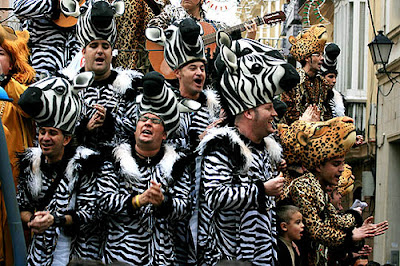Carnal Knowledge
"!Don Carnal llega!" the headline in our local paper announced last week. It's carnival time! Like New Orleans, Rio de Janeiro and Trinidad, Spain shakes out its feathers at the passing of winter with a flamboyant celebration of Martes Gordo - Mardi Gras or Shrove Tuesday. Most Spanish towns celebrate carnaval with parades, lavish costumes and non-stop partying; Tenerife and Sitges are among the most flamboyant. Some of them go on for a week or two.
The excesses of carnaval are intended to prepare us for Cuaresma (Lent)- forty days of abstinence from the pleasures of the flesh. The word probably comes from the Latin carnem levare, to put away meat, or carne vale, farewell to the flesh. Like so many Christian customs, the feast evolved from a pagan ritual: lupercalia, a time for spring-cleaning and spiritual purification, which took place in mid February. In Britain, all that survives is pancake-tossing (and even that makes the Health and Safety people twitchy these days).
The first reference to Don Carnal, ruler of the festivities, appears in a book from 14th Century Spain entitled El Libro de Buen Amor. Written in 1330, it records in verse some of the best loved stories and traditions of the time, including a battle between Don Carnal and Doña Cuaresma, excess versus austerity, a satire on the church and the excesses committed by some of the clergy.
But down here in Cádiz we have something quite unique, as well as the costumes and parades. Gaditanos are famous for their wit, a bit like Scousers (Liverpudlians) are in the UK, and Cadiz Carnival has a tradition of satirical, witty and sometimes scandalous songs, or cuplés, usually aimed at the rich and powerful or referring to topical events, performed by groups of singers and musicians in costume.
The Teatro de las Fallas hosts a contest for the best acts, involving several weeks of eliminatory heats. There are four main categories: chirigotas, cuartetos, comparsas and coros. Every town in the Province sends in their best groups, or agrupaciones, and the heats are broadcast live on TV. Prizes are awarded for the best lyrics, the best costumes and the best musical arrangements for each category.
On the weekend after the finals, hundreds of thousands of people take to the streets of Cádiz, many in costume, to watch the groups parade round the streets on the backs of lorries, and perform in the bars and plazas throughout the town.
The groups are traditionally all male, but this year the Asociaciones de Mujeres de Cádiz made an appearance on 8 March (International Women's Day) with a feminist cuplé (song) - death to machismo!
More on Cadiz Carnival
The excesses of carnaval are intended to prepare us for Cuaresma (Lent)- forty days of abstinence from the pleasures of the flesh. The word probably comes from the Latin carnem levare, to put away meat, or carne vale, farewell to the flesh. Like so many Christian customs, the feast evolved from a pagan ritual: lupercalia, a time for spring-cleaning and spiritual purification, which took place in mid February. In Britain, all that survives is pancake-tossing (and even that makes the Health and Safety people twitchy these days).
The first reference to Don Carnal, ruler of the festivities, appears in a book from 14th Century Spain entitled El Libro de Buen Amor. Written in 1330, it records in verse some of the best loved stories and traditions of the time, including a battle between Don Carnal and Doña Cuaresma, excess versus austerity, a satire on the church and the excesses committed by some of the clergy.
 |
| The Battle between Don Carnal and Doña Cuaresma |
The Teatro de las Fallas hosts a contest for the best acts, involving several weeks of eliminatory heats. There are four main categories: chirigotas, cuartetos, comparsas and coros. Every town in the Province sends in their best groups, or agrupaciones, and the heats are broadcast live on TV. Prizes are awarded for the best lyrics, the best costumes and the best musical arrangements for each category.
On the weekend after the finals, hundreds of thousands of people take to the streets of Cádiz, many in costume, to watch the groups parade round the streets on the backs of lorries, and perform in the bars and plazas throughout the town.
The groups are traditionally all male, but this year the Asociaciones de Mujeres de Cádiz made an appearance on 8 March (International Women's Day) with a feminist cuplé (song) - death to machismo!
More on Cadiz Carnival




Comments